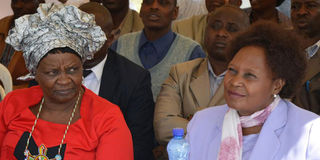Nakuru Woman rep Mbugua confident of trouncing challengers

Nakuru Woman rep Mary Mbugua (left) and Othaya MP Mary Wambui attend a function by Ahadi Trust Kenya at St Loise Primary School in Laikipia on May 31, 2016. Ms Mbugua was elected, in 2003, on The National Alliance Party (TNA) ticket. PHOTO | STEVE NJUGUNA | NATION MEDIA GROUP
What you need to know:
- Ms Karigu says she hopes to create platforms, especially for the modern women, to reduce the high rate of unemployment.
- Ms Karuga, a salonist in Nakuru town, says her ambition follows her interactions with women in her day to day life.
The race for Nakuru Woman rep promises a titanic battle with 15 aspirants, including incumbent Mary Mbugua, ready to square it out on August 8.
Popularly known as “Mutumia Ngatha” (virtuous woman), Ms Mbugua is facing stiff opposition from among others, nominated Senator Liza Chelule and Ms Gladys Kamuren, a former Nakuru County government official.
Others include 27-year-old Ann Njeri Karigu, a Computer Science graduate, Rev Zipporah Kimani, Ms Grace Kibuku, Ms Purity Muritu, Ms Grace Karuga.
Despite the strong line up from both veteran and first-time politicians, Ms Mbugua believes she will emerge victorious.
Ms Mbugua was elected, in 2003, on The National Alliance Party (TNA) ticket.
Ms Karigu says she hopes to create platforms, especially for the modern women, to reduce the high rate of unemployment.
“I will bring on board people who will help design and develop programmes that will improve the well-being of our people,” she says.
She notes that it was a high time youth and women were given the opportunity to participate in the decision-making process.
“I am equally ready to fight for women recognition in the society,’ she states.
“I was raised up by my grandmother and I believe she equipped me with skills that will help me lead the rest of the women in the right direction,” she states.
Ms Karuga, a salonist in Nakuru town, says her ambition follows her interactions with women in her day to day life.
“My job entails interacting with women every day. Through this, I get to listen to their problems and I have realised they need someone to represent them and raise their issues,” says Ms Karuga.
AFFIRMATIVE ACTION
She says she realised that women of all ages go through a number of challenges and always end up without a solution because there is no proper representation.
She says Kanu is her party of choice out of love and also because former president Daniel Moi helped her clear her school fees years back.
“When I declared my candidature in September 2016, it was on Moi’s birthday. We were hardly five women. The number has risen and we are expecting more, but I have my strategy that will see me through,” she states.
She argues that in her mid-30s, she is in a better position to relate with the majority of the women who are youth.
Ms Kamuren, a former county government official says most women have found themselves in helpless circumstances and are in dire need to improve their lives.
She says her quest for the post is pushed by the urge “to fill the gap that has been felt in Nakuru for the past five years”.
“It feels like we made a wrong choice during the 2013 elections because as women we have never felt the representation,” she claims.
She boasts of her experience in community development for the last 10 years, which she says, has given her first-hand experience in matters affecting women, especially in the rural areas.
“Nakuru County needs a strong woman who will come out and speak on behalf of the rest of the women and I believe I am the right person for the job,” she says.
“Women need money, which they can get through forming saccos, which will be supported through Affirmative Action fund. Women need a market for their products and finally, capacity building which includes training for various skills,” she said, citing the three pillars on which her campaign is based.
HURDLES
She, however, notes that women in politics go through challenges, which include financial constraints.
She notes that women have not invested enough and they become disadvantaged compared to their male counterparts.
“We have other challenges like stereotypes where people think women can’t give quality leadership,” she states.
She points out social media propaganda as another major challenge, which women seeking elective posts have to go through.
“Whenever a woman makes a mistake, the issue is usually over blown especially on social media,” the aspirant says.
She also cites discrimination against women in political parties.



